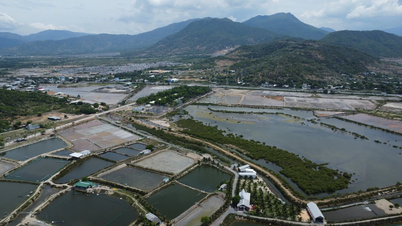
Malaysian people watch Prime Minister Anwar Ibrahim's speech on July 23 - Photo: AFP
From Malaysia, Indonesia to Thailand, stimulus programs worth billions of dollars have been rolled out with the hope of boosting domestic consumption, supporting low-income people and maintaining growth momentum in the context of weakening external demand.
However, the real effectiveness and sustainability of these programs remain a big question mark, especially as the fiscal burden increases.
Billions of dollars to "support" people
According to the South China Morning Post, Malaysian Prime Minister Anwar Ibrahim announced a large-scale relief package on July 23, including a cash handout of 100 ringgit (about 24 USD) to all citizens aged 18 and over.
Mr. Anwar pledged that the money would be distributed in a lump sum on Malaysia's National Day (August 31), expected to reach about 22 million people at a total cost of 2 billion ringgit (472 million USD).
Indonesia also announced a $1.5 billion stimulus package to revive the economy . About 18 million people, mostly low-income, will receive 300,000 rupiah ($18.75) in cash and 10kg of rice each month in June and July.
According to Nikkei Asia, these measures mark a policy reversal after a period of belt-tightening by President Prabowo Subianto's government to fund education and infrastructure investment.
Thailand had hoped to distribute 10,000 baht (US$290) via e-wallet to people, especially the poor, the elderly and young people. However, amid global economic instability and pressure from US tariffs, the plan was canceled in mid-2025, according to The Nation.
Instead of handing out cash outright, Bangkok has decided to reallocate 157 billion baht ($4.81 billion) to a new stimulus package, focusing on supporting businesses hit by cheap imports and boosting key sectors such as tourism and real estate. The shift reflects policy flexibility but also reflects concerns about long-term effectiveness and fiscal risks.
Spend now, worry later?
Direct cash transfers can have an immediate positive effect on consumption and retail sales. South Korea saw more than 4 million applications for cash assistance on the first day alone, with online registration channels being overwhelmed. The Indonesian government expects GDP growth to exceed 5% next quarter thanks to the new package.
However, many experts have expressed concerns about the actual effectiveness. According to expert Syetarn Hansakul shared with Fortune magazine, consumer subsidies often only create a short-term stimulus effect for one or two quarters, after which spending levels will soon return to the old level if real incomes do not improve.
Fiscal burden is another major concern. The spending of billions of dollars comes as many countries face high public debt levels. In South Korea, the consumer subsidy package has pushed the national debt to nearly 1,302 trillion won, or 49.1% of GDP.
In Thailand, before the cancellation of the 10,000 baht distribution plan via e-wallets, household debt had reached 92% of GDP, making credit-based stimulus measures even more financially risky.
Issues of inclusiveness and equity have also been raised. Some experts argue that support packages should be targeted to groups that are truly in need, such as low-income, unemployed, or vulnerable people, rather than distributed evenly across the entire population. If implemented in a widespread manner, the stimulus effect will be diluted while the budget will be under unnecessary pressure, according to Fortune.
South Korea chooses the national solution
Outside Southeast Asia, in South Korea, the Lee Jae Myung administration has launched a 13.9 trillion won ($10 billion) “livelihood restoration coupon” program, according to the Korea Herald on July 21.
Every citizen, regardless of income, will receive at least 150,000 won ($115), while poor households and single-parent families can receive up to 400,000 won ($308). People can choose to receive the money by loading it onto a credit card, debit card, prepaid card or regional consumption coupon.
Source: https://tuoitre.vn/dong-nam-a-phat-tien-de-kich-thich-tieu-dung-20250725080128467.htm


![[Photo] Prime Minister Pham Minh Chinh attends the World Congress of the International Federation of Freight Forwarders and Transport Associations - FIATA](https://vphoto.vietnam.vn/thumb/1200x675/vietnam/resource/IMAGE/2025/10/08/1759936077106_dsc-0434-jpg.webp)




![[Photo] Prime Minister Pham Minh Chinh inspects and directs the work of overcoming the consequences of floods after the storm in Thai Nguyen](https://vphoto.vietnam.vn/thumb/1200x675/vietnam/resource/IMAGE/2025/10/08/1759930075451_dsc-9441-jpg.webp)






























![[Photo] Closing of the 13th Conference of the 13th Party Central Committee](https://vphoto.vietnam.vn/thumb/1200x675/vietnam/resource/IMAGE/2025/10/08/1759893763535_ndo_br_a3-bnd-2504-jpg.webp)
































































Comment (0)